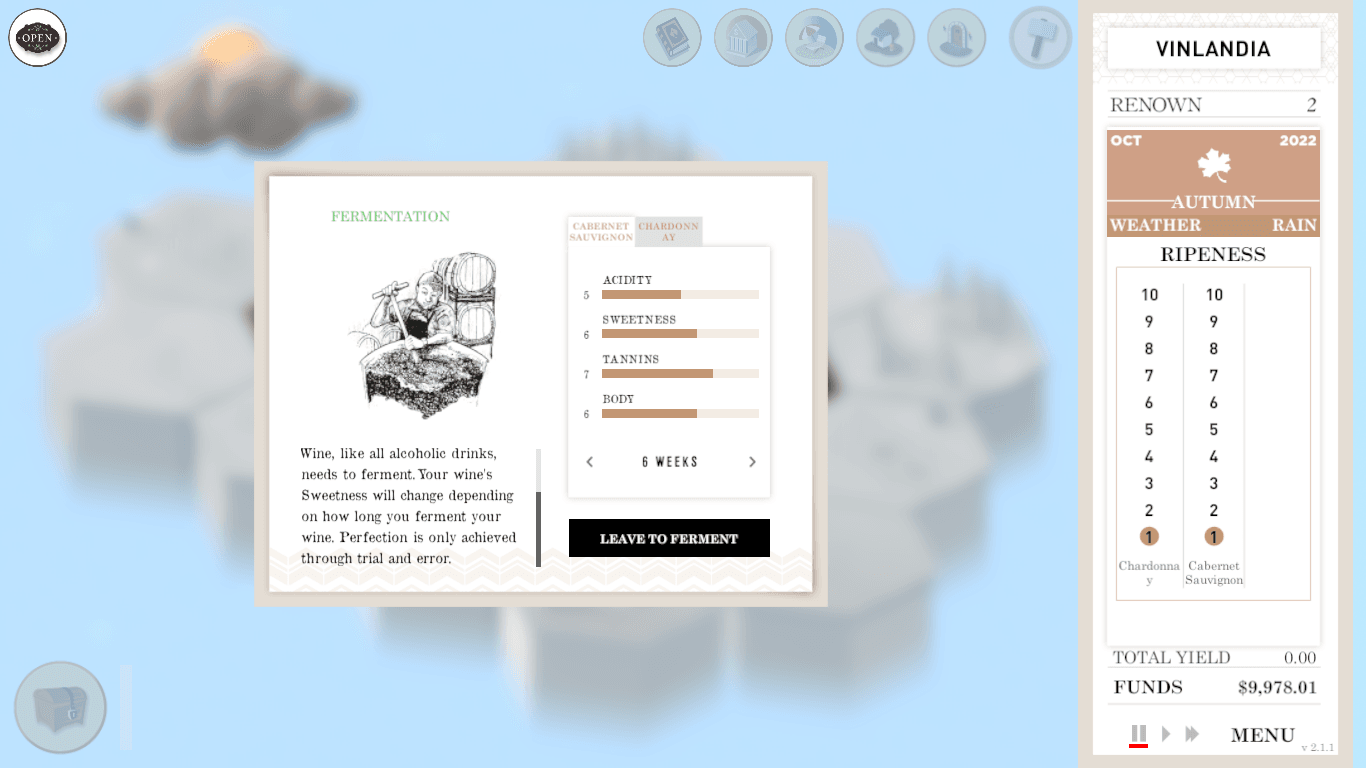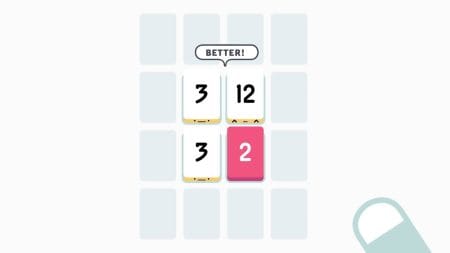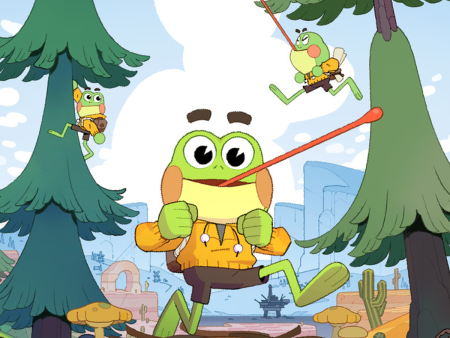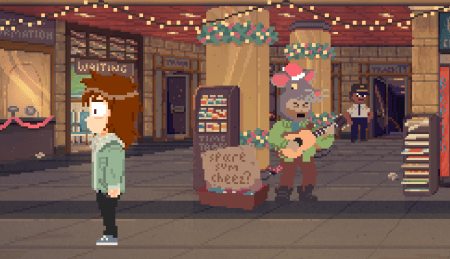Fine Wine
France is a country famous for its food. Walking down the streets of any major city, you’re almost guaranteed to find various boulangeries, fromageries, and pâtisseries selling bread, cheese, and pastries from dawn till dusk. With all of that food, you’re also bound to get thirsty from time to time. Of course, France has you covered for that as well.
Out in the countryside, winemaking is an integral part of French culture and commerce. From Bordeaux to Côtes du Rhone, the regions of France produce everything from the white Chardonnay to the red Pinot Noir and all wines in-between.

Terroir, developed by General Interactive Co., attempts to distill (no pun intended) the act of winemaking down to its essence in the form of a tycoon game. As the proprietor of a vineyard, players begin with a small estate and build and grow their land to become an eventual wine mogul. Along the way, you’ll grow, harvest, and market your wines while managing your income and expenses.
With its interesting and unique premise, Terroir shows a lot of promise in its early hours. However, polish issues and a lack of real depth prevent it from reaching its full potential.

Starting From The Bottom
Terroir begins with minimal instruction. Upon starting a new game and selecting from one of three difficulties, I was greeted with a couple tiles of land and some text boxes.
A pleasant British narrator walked me through some of the basics. Grapes grow on certain soil tiles. By trimming these grapevines’ leaves and foliage in reaction to or in anticipation of certain weather patterns, players aim to maintain a ripeness level between 4 and 6. Doing so awards a more favorable ratio of stats for the grapes—comprised of acidity, sweetness, tannins, and body—upon being harvested.
From there, players experiment with different methods of crushing, fermenting, pressing, and aging the grape juice in order to further influence these stats. Certain wines, like the Cabernet Sauvignon I started with, require different stat levels to produce an optimal batch of wine, whereas others, like a Chardonnay, need something completely different.

The level of quality at which these wines come out is key to success and failure in Terroir. After letting the wine age in a barrel for a selected period of time, players then bottle the wine and invite professional tasters to review the wine on a five-star scale. The better the score, the higher the retail value players are able to sell the wine at to their various distributors.
Crafted the perfect Cabernet, with a ripeness of 5, modest levels in each of the four stats, and a 5-star rating from the critics? You’ll be earning a nice paycheck over the next few months. Botch the wine, however, and you’ll be forced to sell at a lower price, putting your estate at risk if your revenue dips too far below your fixed costs. This constant ebb and flow between winemaking perfection and disaster is at the heart of Terroir’s gameplay, and makes for an addicting experience, at least initially.

Magnifying Glass Required
Unfortunately, Terroir is held back by several problems, both big and small. For a game where so much of the actual gameplay relies on navigating and reading menus, the text in the game is extremely hard to read. In addition to being small in size, the text is also surprisingly blurry, as if the letters are blown up textures rather than being properly scaled to my computer resolution. Even when changing to a lower resolution, however, I still didn’t see any marked improvement of this issue.
Equally boggling is the fact that there is an option in the menu screen to increase font size that doesn’t seem to do anything. Dragging the bar to the biggest possible size had no effect on the text itself, and while I assume it’s likely a bug, it’s a pretty glaring one, considering the nature of the game. Combine these text issues with instances of missing words and ends of sentences, like with the game’s ‘game over’ screen, and it’s clear that Terroir lacks a lot of the polish I’ve come to expect from modern tycoon games.

Sour Grapes
Unfortunately, even ignoring the text and writing bugs currently hindering the game, Terroir just isn’t that rewarding to play. That isn’t to say the game isn’t fun—my first couple of playthroughs were enjoyable romps though the trial and error of winemaking. Experimenting to find the optimal “recipe” for each of the game’s wines provides a nice puzzle-like element to the gameplay, and earning my first 5-star review from critics was an exhilarating moment for me and my winery. That said, the game simply lacks the depth needed to keep longer and later playthroughs interesting.
I liken Terroir quite a bit to the famous board game Monopoly. Both games have inherent charm to them. Both make use of random events cards (Chance & Circumstance in Terroir versus Chance & Community Chest in Monopoly) that ensure that no two games play out exactly the same way. Both focus on growing a business, managing income, and avoiding bankruptcy.

However, where Terroir stumbles compared to its competition is with its replayability, or lack thereof. Playing through the game multiple times, the underlying gameplay loop remains the same: hover over and cut crops until the end of the year rolls around, harvest them in December, press this wine but don’t press the other, have critics taste test, sell the wine… rinse and repeat. Eventually, the game becomes less a test of calculations and planning, and more a test of patience and repetition.
It doesn’t help that the game’s systems are often unforgiving. There’s no clear cut indication of when a game over may appear (it doesn’t immediately happen upon having a red cash flow), making the ends of games unnecessarily confusing and frustrating. And while event cards are present, they just don’t add enough to make up for the remaining 95% of gameplay spent watching clouds pass over your vineyard, waiting for the next harvest season to arrive.

Harvest in Style
If there’s one thing that helps keep things fresh from playthrough to playthough, it’s Terroir’s magnificent soundtrack. Provided by Singapore’s CLARQuinet ensemble, the music of Terroir is a soothing mix of orchestral horns and woodwinds that made me feel as if I were really living in the countryside of France, basking in the sun and sipping on my very own wine. The game’s visuals, while simplistic, are just as pleasant.
For a game where most of the actual gameplay boils down to clicking, reading, and waiting, Terroir’s presentation makes the process a lot more engaging.

Final Thoughts
Terroir is a fun but flawed look into the world of winemaking. The game lacks a layer of polish (surprising considering the game had been in early access up until late September), as well as the long-term depth needed for a truly great simulation management game.
It may offer a few fun hours of grape-picking bliss, especially for wine aficionados, but beware that the fun wears off quite quickly in the world of Terroir.
Score: 6.5/10
David is the founder of The Punished Backlog. He has a problem finishing games he starts.
Just beat: Hollow Knight: Silksong.
Working on: Yakuza 0, Iconoclasts, Metroid Prime 4: Beyond.
Can't wait for: Demon Tides.
Follow David on Twitter at @David_Silbert to keep up to date with all things The Punished Backlog.










